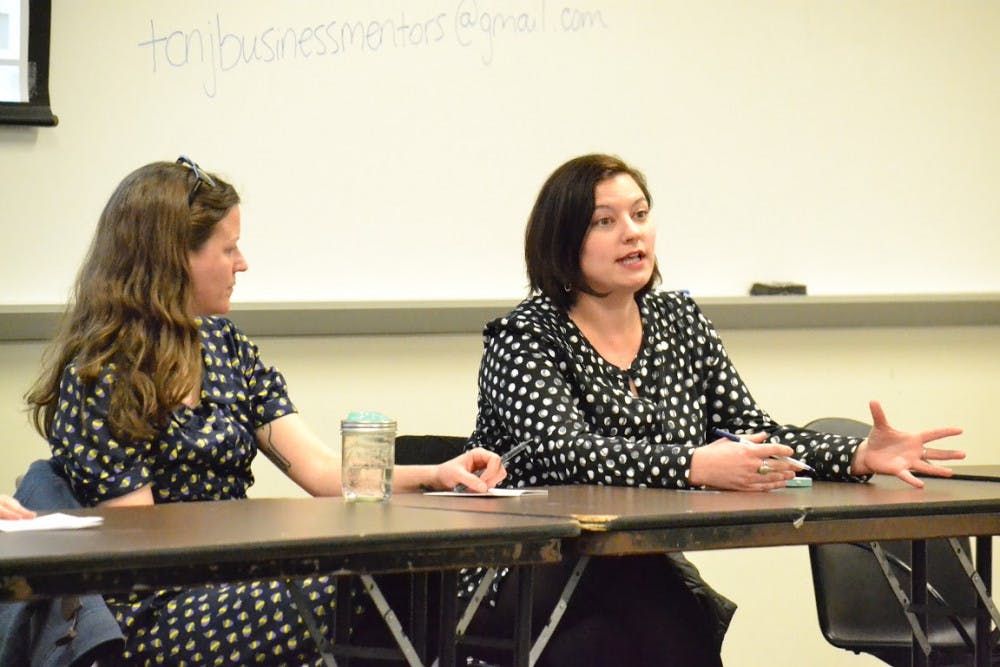By Meghan Coppinger
Correspondent
Graduates of the Women’s and Gender Studies (WGS) Department at the College were invited back to their alma mater for an open discussion on reproductive health and rights. The event was an opportunity for students to network and learn more about what the future could hold with a degree in WGS.

The four alumni included Kelly Baden, director of state advocacy for the Center of Reproductive Rights; Ria Rodney, research assistant for the Domestic Violence Enhanced Home Visit Program (DOVE) at Johns Hopkins University; Leah Chamberlain, the administrator of Philadelphia Women’s Center; and Kristen Daskilewicz, a research coordinator for Global Health Network who was Skyping from Cape Town, South Africa.
“It was great to see women that took gender studies and made it not only into a career, but a way to continue their activism and passions,” senior psychology major Samantha Dooley said.
Only two questions were asked of the four panelists, but they elicited in-depth discussion and information. Janet Gray, WGS professor and event moderator, advised the audience to “hear about their journeys and envision your own future.”
The first question asked the graduates about their work and their paths from the College to where they are now. All four women chose different careers that echoed similarities in advocacy and activism in reproductive health across the world.
Baden, who works in advocating for women’s reproductive rights, learned “all of the skills (she) could,” including reading litigation, creating press releases, helping pass local-level policies and improving reproductive rights.
Daskilewicz discussed her journey from being raised on conservative reproductive health views to becoming “incredibly passionate” about abortion rights. She worked in Philadelphia as a hotline counselor for CHOICE-Hotline, where she learned to talk about sexual health issues. Daskilewicz was impacted by “hearing people be vulnerable and hearing their stories.”
Going with this year’s theme of justice during Women’s History Month at the College, the second question asked the panelists how their personal and work experiences has enhanced their ideas of justice.
“Justice, that’s huge,” said Chamberlain, who noted that thinking of the bigger picture when helping women one-on-one is vital to justice.
Baden agreed, adding that is is “fundamentally ‘effed-up’ that a woman in Mississippi has a different set of rights than a woman in California.” She incorporates reproductive justice into her job by partnering with reproductive organizations to “lift up their voices” by using technology and social media.
Daskilewicz described some challenges when thinking about justice in her area of work. Although Cape Town, in theory, has liberal abortion laws, she said there can be trouble for women trying to access proper abortion care.
“There is extreme economic inequality here,” Daskilewicz said, adding it took a long time to find pro-choice and feminist movements in the community.
Rodney spoke of finding many pathways to justice in her line of work while interacting with pregnant women experiencing domestic violence. One, she noted, was finding “strange bedfellows” to help accomplish goals in justice.
She recalled feeling apprehensive when working with other advocacy groups that she felt had nothing in common with her work. But finding a common space can “create an alliance” with people who can help make a difference.
“Together, you will accomplish so much,” Rodney said.
After the panelists shared their experiences, the floor was opened for student discussion and questions.
The four women realized their careers truly intersected when a student asked how to stay passionate after years of working.
“You can’t be a single-action person,” Chamberlain said.
Although Daskilewicz admitted to feeling “burnt out” at a stage in her career, she agreed with Chamberlain that “finding an activist space outside of a job” was important to refuel the energy and desire for change.
“Seeing that they have made a difference in the lives of many women on both an individual and community level was inspiring,” Dooley said.
When a student inquired about which skills learned from being a WGS major at the College were applicable in the real world, Rodney credited “having stellar relationships with faculty” and connecting with individuals who can act as role models for your career.
The College’s Chair of the WGS Department, Ann Marie Nicolosi, expressed to the alumni how proud the department is to say these four women belong to it.
“You’ve gone so beyond what we imagined what our graduates would do,” Nicolosi said.







